Effects of Promove-Crianças on Children’s Repertoires and Educational Practices According to Parents and Teachers
DOI:
https://doi.org/10.32870/ac.v33i2.88587Keywords:
social skills, behavior problems, children, academic performance, multiple evaluations, group intervention, Promove-Crianças, parent-child relationship, teacher-student relationshipAbstract
Interventions in children’s social skills that reduce the frequency of behavioral problems, resulting in changes in parents’ and teachers’ repertoires, are a gap in the developmental psychology literature. Multimodal programs are sought, with multiple assessment instruments and multiple respondents, to increase the possibility of generalizing the taught behaviors. Therefore, the present research aimed to describe the effects of the Promove-Crianças intervention procedure (Falcão & Bolsoni-Silva, 2016) in the school and family environment in a preexperimental design (no control group) with multiple probes. The participants were 20 children, their parents/guardians, and teachers who gave lessons in the regular classroom and responded to reporting instruments at three different times: baseline, pretest, and post-test. The Promove-Crianças program (Falcão & Bolsoni- Silva, 2016) is based on the Behavior Analysis theoretical axis, and consists of 10 structured sessions which aim primarily to improve pre-determined social skills while reducing behavior problems. The themes of each session are: Session 1 - Greeting and initiating conversation and Civility; Session 2 - Thanking, speaking nice things and expressing opinions; Session 3 - Making friends and helping; Playing and sharing things; Session 4 - Waiting for my turn and controlling myself; Session 5 - Expressing frustration appropriately; not letting oneself be
intimidated; Session 6 - Naming feelings and Empathy; Session 7 - Expressing rights and needs accordingly; participating in discussion themes; Session 8 - Giving praise, kissing and hugging; Session 9 - Making requests, answering requests and thanking; Session 10 - Admitting mistakes, apologizing and listening to criticism. The students attended the first year of elementary school in municipal schools in a city in northern Paraná, Brazil. To be included in the research, children should present a high frequency of internalizing, externalizing, and total behaviors from the perspective of parents and teachers. The instruments, applied to parents/guardians and teachers, measured child behaviors and educational practices. After the intervention, the repertoires of the participating children, their parents, and teachers were compared across the evaluation stages. The results, in general, indicated that the children showed a decrease in behavioral problems and an increase in social skills. There was also an increase in positive parenting practices and a decrease in negative teacher practices. Specifically, children showed a significant decrease in behavioral problems through parents and teacher evaluation. Regarding social skills in parent evaluation, in one instrument, children significantly improved total social skills, and cooperation, while on the other, parents significantly improved their positive practices. Regarding social skills in teacher evaluation, children significantly improved sociability, emotional expressiveness and their search for support in one instrument, while on the other, the children significantly improved their social skills and significantly decreased their behavioral problems, while teachers significantly reduced their negative practices. New research made with the program, replicating it in other regions and with stronger methodologies, verifying effectiveness and possible generalizability are suggested.
Downloads
Downloads
Published
How to Cite
Issue
Section
License

<a rel="license" href="http://creativecommons.org/licenses/by-nc-sa/4.0/"><img alt="Licencia de Creative Commons" style="border-width:0" src="https://i.creativecommons.org/l/by-nc-sa/4.0/88x31.png" /></a><br />Este obra está bajo una <a rel="license" href="http://creativecommons.org/licenses/by-nc-sa/4.0/">licencia de Creative Commons Reconocimiento-NoComercial-CompartirIgual 4.0 Internacional</a>.






